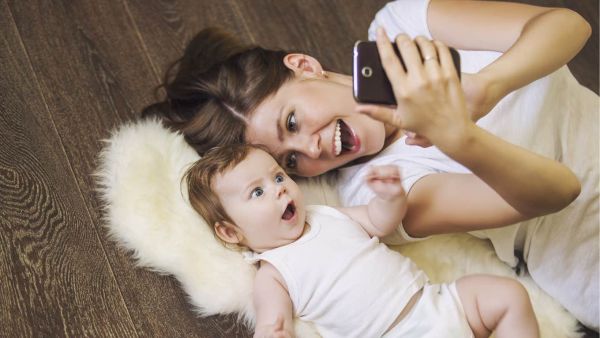
There’s nothing quite like taking a stroll down memory lane to put a smile on your face. Seriously, whenever you’re feeling a little sad, ask your mom to look through your baby book with you — that nostalgia therapy is a balm to even the worst mood. Unless you were born during the 2010s. Sorry, Gen Alpha.
It wasn’t enough for your parents to have a camera literally in their back pockets at all times — they had to take it a step too far, all in the name of Snapchat. Make fun of older generations all you want, but you’ll find nary a Polaroid in a millennial’s baby book that has the face of a dog superimposed on it.
For some reason, the novelty of Snapchat filters took over during those 2010 years, and as a mom who goes by Marisa on Teltok pointed out, those filters ruined the baby photos of nearly an entire generation.
Snapchat filters were all the rage in the 2010s. For many users on the app, using filters became second nature to shift one’s appearance. Marisa pointed out this regrettable trend in a slide show of baby pics of her own daughter, and all the photos were filtered almost beyond recognition.
“When your daughter wants to see her baby pictures but she was born in 2017,” she wrote in the video. What followed were photos of her daughter with cartoonish wide eyes, a pink background with hearts, flower crowns, and sunglasses, and, yes, the ubiquitous animal ears and noses.
Zyabich family | Shutterstock
For parents of children born in the 2010s, Snapchat filters were novel and new. The filters were easy and accessible. And yes, they were undeniably cute.
Unfortunately, like all fads, they became so popular that they eventually fell out of favor, but that wasn’t before some adorable baby photos were permanently altered, leaving moms and dads with cartoon memories instead of classic baby pics.
: Daughter Shows Examples Of How Her ‘Facetune Mom’ Edits Her Face & Body Before Posting Pics Online — ‘To Edit Me Like That Is Weird Behavior’
Marisa’s TikTok was all in good fun, but her video did bring up an interesting change in how memories are captured and how photos have been impacted by social media.
Before Facebook and Instagram, parents would capture childhood memories and milestones using point-and-shoot or digital cameras. These images were usually raw and unfiltered, mostly because only professional photographers and graphic designers had the know-how to use complex photo editing software like Photoshop.
Suddenly, technology shifted. Cell phones had cameras built into them, and with each generation of phones came more advancements to those cameras. Eventually, cell phone cameras became better than our digital cameras, and those cameras became a nuisance to carry around with us.
 Amorn Suriyan | Shutterstock
Amorn Suriyan | Shutterstock
The rest is so-called history, however. Social media grew right along with our tech, and in an effort to distinguish themselves from each other, photo editing became accessible and ubiquitous. So, yes, the Snapchat filters fell out of favor, but editing photos has not.
But not everyone is a fan. In a piece for PetaPixelJoseph Campanella wrote, “I’ll be the first to admit that I found these tools interesting when I first came across them. I used applications like Hipstamatic and Instagram, showing all my friends and family how fun the images from my phone looked ad nauseam.”
He continued, “But years later, as I run through my library of pictures, I see these fake borders, this digital patina, and I’m a little letdown. Right next to these fake filtered ‘fun’ pictures are the ones I didn’t filter. And as I look back on them, even a few short years later, I find myself waxing nostalgic about how these old cameras and phones looked.”
: A Photographer Explains Why He Doesn’t Edit His Wife In His Own Family Photos The Way He Edits His Clients
The TikTok post also taps into a much broader conversation on digital identity. Younger generations view the world through the lens of social media and filters. The impact on how these children may see themselves and their memories is profound. While filters may come across as harmless, they leave behind a digital footprint that doesn’t mirror reality.
The children who grow up with dog tongues on their baby photos aren’t exactly struggling to differentiate between what is real and what is fake. Still, the changing trends in editing and the comparison culture cultivated by sharing these images as real on social media makes that much harder to distinguish.
A 2021 study out of the City University of London found that 90% of participants between the ages of 18 and 30 admitted to using filters or editing software on their images. 90% also admitted that they felt pressure to post perfect images of themselves on social media, and over 75% felt that they couldn’t live up to the standards set by social media.
The use of filters may seem insignificant, but it is part of a much larger issue: how social media is reshaping the way we record, reflect upon, and even remember the past. More importantly, it’s reshaping how we perceive ourselves.
: Man Ends A Date As Soon As The Girl Shows Up Because She Uses Filters On Social Media
Erika Ryan is a writer working on her bachelor’s degree in Journalism. She is based in Florida and covers relationships, psychology, self-help, and human interest topics.